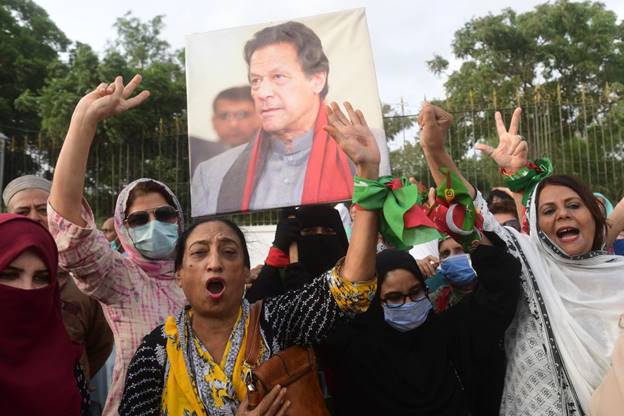
Pakistan Tehreek-e-Insaf (PTI) party activists and supporters protest against the arrest of Pakistan's former Prime Minister Imran Khan, in Karachi on Aug. 27, 2023 - Asif Hassan/AFP via Getty Images
Pakistan's Democracy Is at Stake
By Asif Mahmood, MD
Pulmonologist and Doctor of Internal Medicine
Los Angeles, CA
Pakistan finds itself at a critical juncture, grappling with political upheaval and economic turmoil, echoing its tumultuous history. Since the country's disintegration in 1971, military interventions and political transitions have deeply scarred the nation's democratic fabric, pushing it into a fragile state.
The roots of Pakistan's current challenges trace back to the aftermath of the 1971 War , when East Pakistan became Bangladesh. Military dominance and political maneuvering contributed to discontent, ultimately leading to the birth of a new nation. Subsequently, military influence persisted, whether through direct martial law or indirect control over civilian governments. Leaders like Zulfikar Ali Bhutto faced accusations of election rigging and martial law, while Muhammad Zia-ul-Haq's era saw the entrenchment of conservative Islam and the rise of the Taliban , adding to geopolitical complexities.
In recent times, Imran Khan's ascent to political prominence, initially celebrated for cricket heroics and philanthropy, faced challenges, including strained relations with the military and allegations of foreign interference, culminating in a no-confidence motion. Imran Khan's political ousting raised concerns, with reports of human rights abuses, dissent crackdowns, and allegations of election rigging casting doubt on the current government's legitimacy. This has further destabilized a region already prone to volatility.
The government's actions are alarming, marked by a sharp curtailment of democratic freedoms. A crackdown on Pakistani dissidents, journalists, and activists intensifies, eroding the foundations of democracy. Reports of human rights abuses, especially targeting vulnerable groups, paint a bleak picture. Forced disappearances, arbitrary detentions, and brutal interrogations have become commonplace, traumatizing families and instilling fear. Pre-election rigging and denial of political rights signal a troubling departure from democratic principles.
The consequences of this erosion of democracy are profound, leading to internal unrest and dissatisfaction, contributing to social and economic instability. The disillusionment of the youth, exacerbated by the government's actions, risks deepening existing divisions.
Externally, the region feels the impact, with a politically unstable Pakistan posing challenges for neighbors and fostering an environment conducive to extremism and tensions. The erosion of democratic norms has far-reaching implications for the stability of South Asia.
Recent developments, as highlighted in the Economist Intelligence Unit Democracy Rankings 2023 report, where Pakistan has been downgraded to an authoritarian regime, underscored the severity of the situation. Michael Kugelman of the Washington-based Woodrow Wilson International Center for Scholars noted in a recent article in The Economic Times , "That it is unfortunate that after 15 consecutive years of formal civilian rule and some decentralization reforms that strengthened Pakistan's democracy, the country has regressed to the point where it's being characterized as less democratic than it was during periods of formal military rule."
This information adds urgency to the ongoing narrative. Pakistan's economic stability is closely tied to the International Monetary Fund (IMF), serving as a crucial financial lifeline, serving as a crucial financial lifeline. Beyond addressing economic challenges, the IMF's role encompasses fostering an environment conducive to sustainable growth. Continued financial support from the IMF is contingent upon Pakistan's adherence to democratic norms and the protection of human rights. It is not merely about fiscal responsibility; it is about upholding principles that underpin a stable society.
As a critical player in Pakistan's economic landscape, the IMF must demand a reversal of undemocratic actions. The conditions for financial assistance should explicitly include a commitment to democratic governance, the protection of human rights, and adherence to the rule of law. The international community, with the IMF at the forefront, has a responsibility to guide Pakistan toward political reform. The economic stability of the nation is at stake, and the IMF must leverage its position to encourage positive change. By demanding a course correction on undemocratic actions, the IMF can play a pivotal role in fostering a stable and prosperous future for Pakistan.
The urgency of Pakistan's situation cannot be overstated. The erosion of democracy has severe consequences for the people and the region. Institutions like the IMF must play a proactive role in ensuring that the government upholds democratic values. The IMF's influence can extend beyond economic stabilization, becoming a catalyst for political reform. It is time for global powers to stand in solidarity with the people of Pakistan, advocating for a return to democratic principles, and fostering a stable and prosperous future.
(Asif Mahmood, MD, is a pulmonologist and doctor of internal medicine. He and his family have lived in Southern California since 1999. He serves on the California Medical Board and on the board of the Valley Rescue Mission, the largest homeless shelter in Southern California. He is also chair of the Organization for Social Media Safety that fights cyber-bullying and cyber-exploitation of children. - Newsweek)

